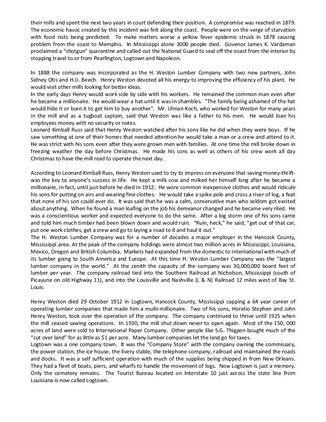This text was obtained via automated optical character recognition.
It has not been edited and may therefore contain several errors.
their mills and spent the next two years in court defending their position. A compromise was reached in 1879. The economic havoc created by this incident was felt along the coast. People were on the verge of starvation with food riots being predicted. To make matters worse a yellow fever epidemic struck in 1878 causing problem from the coast to Memphis. In Mississippi alone 3000 people died. Govenor James K. Vardaman proclaimed a "shotgun" quarantine and called out the National Guard to seal off the coast from the interior by stopping travel to or from Pearlington, logtown and Napoleon. In 1888 the company was incorporated as the H. Weston Lumber Company with two new partners, John Sidney Otis and H.U. Beech. Henry Weston devoted all his energy to improving the efficiency of his plant He would visit other mills looking for better ideas. In the early days Henry would work side by side with his workers. He remained the common man even after he became a millionaire. He would wear a hat until it was in shambles. "The family being ashamed of the hat would hide it or burn it to get him to buy another". Mr. Ulman Koch, who worked for Weston for many years in the mill and as a tugboat captain, said that Weston was like a father to his men. He would loan his employees money with no security or notes. Leonard Kimball Russ said that Henry Weston watched after his sons like he did when they were boys. If he saw something at one of their homes that needed attention he would take a man or a crew and attend to it. He was strict with his sons even after they were grown men with families. At one time the mill broke down in freezing weather the day before Christmas. He made his sons as well as others of his crew work all day Christmas to have the mill read to operate the next day. According to Leonard Kimball Russ, Henry Weston used to try to impress on everyone that saving money-thrift-was the key to anyone's success in life. He kept a milk cow and milked her himself long after he became a millionaire, in fact, until just before he died in 1912. He wore common inexpensive clothes and would ridicule his sons for putting on airs and wearing fine clothes. He would take a spike pole and cross a river of log, a feat that none of his son could ever do. It was said that he was a calm, conservative man who seldom got excited about anything. When he found a man loafing on the job his demeanor changed and he became very riled. He was a conscientious worker and expected everyone to do the same. After a big storm one of his sons came and told him much timber had been blown down and would ruin. "Ruin, heck," he said, "get out of that car, put one work clothes, get a crew and go to laying a road to it and haul it out." The H. Weston Lumber Company was for a number of decades a major employer in the Hancock County, Mississippi area. At the peak of the company holdings were almost two million acres in Mississippi, Louisiana, Mexico, Oregon and British Columbia. Markets had expanded from the domestic to international with much of its lumber going to South America and Europe. At this time H. Weston Lumber Company was the "largest lumber company in the world." At the zenith the capacity of the company was 30,000,000 board feet of lumber per year. The company railroad tied into the Southern Railroad at Nicholson, Mississippi (south of Picayune on old Highway 11), and into the Louisville and Nashville (L & N) Railroad 12 miles west of 8ay St. Louis. Henry Weston died 29 October 1912 in Logtown, Hancock County, Mississippi capping a 64 year career of operating lumber companies that made him a multi-millionaire. Two of his sons, Horatio Stephen and John Henry Weston, took over the operation of the company. The company continued to thrive until 1925 when the mill ceased sawing operations. In 1930, the mill shut down never to open again. Most of the 150, 000 acres of land were sold to International Paper Company. Other people like S.G. Thigpen bought much of the "cut over land" for as little as $1 per acre. Many lumber companies let the land go for taxes. Logtown was a one company town. It was the "Company Store" with the company owning the commissary, the power station, the ice house, the livery stable, the telephone company, railroad and maintained the roads and docks. It was a self sufficient operation with much of the supplies being shipped in from New Orleans. They had a fleet of boats, piers, and wharfs to handle the movement of logs. Now Logtown is just a memory. Only the cemetery remains. The Tourist Bureau located on Interstate 10 just across the state line from Louisiana is now called Logtown.

Weston, Henry 003